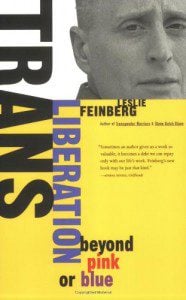Prop 8: The Musical
Progressive Christians are sometimes accused of “picking and choosing” Bible verses for their own convenience. But I would invite you to consider that, upon close inspection, all Christians pick and choose when it comes to the Bible. The same Bible has been used throughout history to affirm both slavery and emancipation, sexism and equality, violence and nonviolence. The question, then, becomes what criteria should we use to pick and choose between various parts of scripture. This week’s Gospel lesson invites us to consider Jesus’ own way of reading scripture as a potential model for picking and choosing.
In the weeks leading up to the November 2008 general election in California, a group of actors posted a video to YouTube called “Prop 8: The Musical” to protest a proposed amendment to that state’s constitution that says, “Only marriage between a man and a woman is valid.” In the video, a group of conservatives and a group of liberals are arguing over what the Bible says about homosexuality when comedian Jack Black suddenly appears dressed as Jesus.
When asked if the Bible says that, “‘These people’ are an abomination,” he smirks, “Well, it says the exact same thing about this shrimp cocktail.” Jack Black as Jesus continues, “You know, the Bible says a lot of interesting things…like you can stone your wife or sell your daughter in slavery.”
Aghast, someone in the crowd objects, “Well, we ignore those verses.”
Jack Black as Jesus retorts, “Well then, it seems to me you pick and choose; and if you pick and choose, why not choose love instead of hate?” Through humor, the actors manage in approximately three minutes to get to the heart of the matter regarding how we can and should interpret the Bible in a postmodern context as twenty-first century Christians.
We should not be surprised at this “picking and choosing” for at least two reasons. First, the Bible is a sprawling anthology, written and edited over the course of centuries. Furthermore, the biblical authors wrote for many different reasons, and none composed with the hope that their writing might be accepted for publication in a book called the Bible. Instead, both the people of Israel and the early Christians, at different points, collected and edited what some considered the most important of their theological writings, and these collections over time became included in the various forms of the Bible.
Second, we should not be surprised that everyone engages in “picking and choosing” because if you survey what the Bible has to say about, for example, anger, wealth, adultery, disobedient wives and children, marriage, and divorce it becomes clear that the Bible is simultaneously both contradictory and enormously demanding. In other words, it is essentially impossible to obey all that the Bible literally says because some parts of the Bible are mutually exclusive of other parts. Does this mean that we are free to choose willy-nilly which parts of the Bible to follow? To quote the apostle Paul’s repeated refrain from the epistle to the Romans, “By no means!” However, from the perspective of progressive Christianity, Jack Black as Jesus is right when he says, “If you pick and choose, why not choose love?”
Now that so many in our society have experimented with reading the Bible as if it were any other historical or literary work, this newfound freedom in the wake of modern methods of interpretation does not mean that we can make the Bible say anything. Instead, as Yale New Testament scholar Dale Martin argues, the freedom of the individual interpreter means that individual, free interpreters are themselves “responsible for the truth, goodness, morality, and social effect of how you interpret the Bible or any other text.”
The point is that if someone’s interpretation leads to violence, oppression, and inequality instead of liberation, justice, and peace, then scholars such as Martin invite us to consider that the responsibility is as much or more on that person’s interpretation than on the Bible. One could similarly say that it is illegitimate for anyone to blame the Bible for her or his hate, apathy, or vengefulness, just as it is illegitimate to blame racism, sexism, heterosexism, or any other oppression on the Bible. From the opposite angle, one could argue that whatever does not lead to love, compassion, forgiveness, justice, mercy, and grace — what Paul called the “fruit of the Spirit”: love, joy, peace, patience, kindness, goodness, faithfulness, gentleness, and self-control (Gal 5:22-23) — has strayed from the way of God as revealed in the life of Jesus. If you pick and choose, why not choose love?
“Great Commandment Christianity”
When considering how to be responsible in the face of postmodern freedom, it is significant to note that choosing love instead of hate is precisely what Jesus did at his best. When asked, “Which commandment is the first of all?” Jesus could have selected from the Torah any of the commandments. He could have chosen of one the passages that have been used to justify patriarchy, xenophobia, or violence; but he chose the commandment in Deuteronomy 6:5 that, “You shall love the Lord your God with all your heart, and with all your soul, and with all your might.”
Then Jesus went the “second mile” (Matt 5:41) beyond what his questioner had asked, and offered insight on which commandment he considered the second greatest. This time, Jesus looked to the book of Leviticus. Jesus, again, could have chosen any verse from the Torah to emphasize. Especially after choosing the love of God for the Greatest Commandment, perhaps it would have been logical to counterbalance this compassionate choice with a more “realistic” option; however, Jesus singled-out the essence of the following verse for the second greatest commandment: Lev 19:18, “You shall love your neighbor as yourself.”
By choosing love as his interpretive lens, Jesus echoed the theme of compassion which is at the beating heart at the center of each of the world’s major wisdom traditions. The “Charter for Compassion,” which British writer Karen Armstrong is championing, highlights that,
The principle of compassion lies at the heart of all religious, ethical and spiritual traditions, calling us always to treat all others as we wish to be treated ourselves. Compassion impels us to work tirelessly to alleviate the suffering of our fellow creatures, to dethrone ourselves from the centre of our world and put another there, and to honor the inviolable sanctity of every single human being, treating everybody, without exception, with absolute justice, equity and respect.
It is also necessary in both public and private life to refrain consistently and empathically from inflicting pain. To act or speak violently out of spite, chauvinism, or self-interest, to impoverish, exploit or deny basic rights to anybody, and to incite hatred by denigrating others — even our enemies — is a denial of our common humanity. We acknowledge that we have failed to live compassionately and that some have even increased the sum of human misery in the name of religion.
We therefore call upon all men and women to restore compassion to the centre of morality and religion, to return to the ancient principle that any interpretation of scripture that breeds violence, hatred or disdain is illegitimate, to ensure that youth are given accurate and respectful information about other traditions, religions and cultures, to encourage a positive appreciation of cultural and religious diversity, to cultivate an informed empathy with the suffering of all human beings — even those regarded as enemies.
We urgently need to make compassion a clear, luminous and dynamic force in our polarized world. Rooted in a principled determination to transcend selfishness, compassion can break down political, dogmatic, ideological and religious boundaries. Born of our deep interdependence, compassion is essential to human relationships and to a fulfilled humanity. It is the path to enlightenment, and indispensable to the creation of a just economy and a peaceful global community.
Armstrong is a strong contemporary example of the movement to choose an interpretive lens of love and compassion, as a centering ballast amidst the decentering currents of our postmodern context.
As we become aware of the compassion at the heart of the world’s religions and Jesus’ choice to emphasize love in his scriptural interpretation, one potential response is for followers of Jesus to attempt to interpret scripture as Jesus himself did. When Jesus interpreted his “Bible” (at that time the ‘canonized’ sacred scripture was only the Torah and the Prophets), he emphasized the verses about loving God and neighbor. Following Jesus, we can do likewise: we can choose to pay more attention to the parts of scripture that increase the love of God and neighbor and to pay less attention to the parts of scripture that decrease the love of God and neighbor. Even better, we can interpret all of scripture so that our interpretation leads to an increase in the love of God and neighbor.
Historian Diana Butler Bass has helpfully popularized the term “Great Commandment Christianity” to help identify the many times throughout church history that followers of Jesus have sought to emphasize the criterion of the love of God and neighbor as centrally important. Scholars such as Dale Martin have also emphasized love as a central criteria for Christian ethics. I am hopeful that we, as twenty-first century religious people, can choose compassion. We can choose love.
In this spirit, public theologian Brian McLaren has said in a passage that is perhaps freshly relevant in light of the Occupy Wall Street protests,
There are two kinds of Christianity, along with two kinds of Islam, Judaism, and every other religion and non-religion too: one of social control and one of social transformation; one to hold people down, one to lift them up; one an opiate to pacify people into compliance, the other a stimulant to empower people to imagine a better world, a better future, a better life — giving them the courage to live in peaceful defiance of violent, corrupt, and greedy powers-that-be. Neither kind is perfect, and both kinds contain good and sincere people. But if those who use God and religion for social control are left to define faith, the religion they define will be a false one, an ugly one, an idolatrous one.
Love, then, is not only our goal, but also our means of getting there. We are invited to achieve the love of God and neighbor through acts of love — and that invitation includes how we read the Bible. In other words, if your interpretation of scripture is not itself motivated by the love of God and neighbor, and if your interpretation of scripture does not lead you and those around you to love God and neighbor more sincerely, then I invite you to consider that the problem lies, not with scripture, but with your interpretation.
Lectio Divina
Having claimed love as our compass and goal, I would like to invite you to briefly experiment with interpreting the Bible in the way that Jesus showed us: reading slowly, prayerfully and sacramentally to listen for how God is inviting us today to choose love.
Read the following piece of scripture twice slowly. Open your heart. Be attentive for any particular word or phrase that stands out to you:
You shall love God with all your heart, and with all your soul, and with all your mind, and with all your strength. You shall love your neighbor as yourself. There is no other commandment greater than these.
Pause for a few minutes of silence to listen silently for how God is speaking to you in this present moment.
For Further Reading
Jack Rogers, Jesus, the Bible, and Homosexuality, Revised and Expanded Edition: Explode the Myths, Heal the Church.
Notes
1 To view the the video, either Google “Prop 8: The Musical” or go to http://www.funnyordie.com/videos/c0cf508ff8.
2 For more on the history of the Bible and the canonization process, see Karen Armstrong’s 2008 book, The Bible: A Biography or Bart Ehrman’s 2005 book Lost Christianities: The Battles for Scripture and the Faiths We Never Knew.
3 On various scriptural interpretations in regard to homosexuality, see Dale Martin’s 2006 book Sex and the Single Savior: Gender and Sexuality in Biblical Interpretation.
4 “By no means” is a repeated refrain in Paul’s Epistle to the Romans.
5 For the Dale Martin quote, see his 2008 book Pedagogy of the Bible: An Analysis and Proposal, 16.
6 For an example of Jesus at his less-than-best, see Mark 7:25 on Jesus’ encounter with the Syro-Phoenician Woman.
7 On the Greatest Commandments, see Mark 12:28-31; Matthew 22:36-40; Luke 10:25-28; John 13:34; and Romans 13:9. For an extensive commentary, see John P. Meier’s 2009 book A Marginal Jew: Rethinking the Historical Jesus, Volume 4: Law and Love.
8 The full verse from Leviticus reads, “You shall not take vengeance or bear a grudge against any of your people, but you shall love your neighbor as yourself: I am the Lord.”
9 For more on Karen Armstrong’s “Charter of Compassion,” visit www.charterforcompassion.org.
10 The Brian McLaren quote is from a blog post, “Iran … two kinds of Islam, and two kinds of religion in general,” available at http://www.brianmclaren.net/archives/blog/iran-two-kinds-of-islam-and-two.html.
11 For Diana Butler Bass’ conception of “Great Commandment Christianity”, see her book A People’s History of Christianity: The Other Side of the Story.
UPDATE: My fellow Patheos blogger Tony Jones wrote a response to this post titled, “Picking and Choosing Your Bible Verses (or, Why To Abandon the Lectionary).” You can also read my follow-up response.]
UPDATE: On February 7, 2012, the U.S. 9th Circuit Court of Appeals ruled that, “Although the Constitution permits communities to enact most laws they believe to be desirable, it requires that there be at least a legitimate reason for the passage of a law that treats different classes of people differently. There was no such reason that Proposition 8 could have been enacted.”
The Rev. Carl Gregg is the pastor of Broadview Church in Chesapeake Beach, Maryland. Follow him on Facebook (facebook.com/carlgregg) and Twitter (@carlgregg).
















